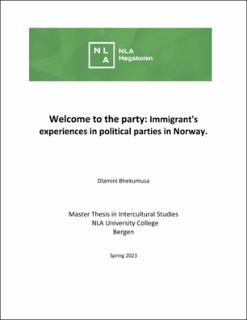| dc.description.abstract | In Norway, like in the rest of Europe and the Western liberal democracies, immigration is a contentious issue of social, political, cultural, and economic discussions. Social and economic integration has been the main focus of the government. Political participation of immigrants on the other hand took years to be a center of focus for government policy, practitioners, and researchers alike. Whereas the role of political parties in the poor participation of immigrants has been understudied.
This study investigates the experiences of immigrants with refugee backgrounds in political parties through an intercultural perspective. The qualitative study is primarily based on 13 interviews of both native and immigrant members of two political parties in Norway (Sosialistisk Venstreparti -SV and Arbeiderpartiet-AP). The thesis presents the pathways of the few immigrants that are in political parties, role of networks in enabling them to find their way into political parties. Likewise, the study identified that those immigrant party members mostly use their sense of agency to be active in political parties. The political parties are weak in recruiting immigrant members which is partly due to a lack of overlapping networks between natives and immigrants. Interestingly, the few who made it into the parties were welcomed very well and were able to stay for many years as active members.
This study reported that Norwegian language is a main barrier for immigrants’ political participation. Those who came as children have a better chance to succeed in party politics than those who came to Norway already as grown-ups. Similarly, this study shows that without having cultural capital, [such as good written and oral political language] immigrants are excluded from party politics. Similarly, the intersection of identities that immigrants embody makes a very complex way of understanding their representation. This places them in a difficult situation balancing between representing immigrants, their supposed constituency ethnic minorities and representing the party. Lastly, this study noted that there was no blatant discrimination inside the parties but immigrant party members experience discrimination from the broader society, especially through digital hate. Inside the parties, not being taken seriously is one important finding, which is a form of subtle discrimination. | en_US |
